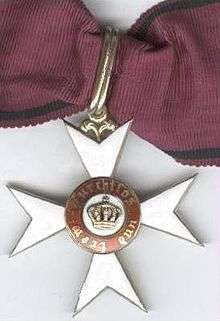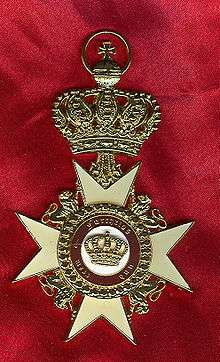Order of the Crown (Württemberg)


The Order of the Württemberg Crown was an order of chivalry in Württemberg.
History
First established in 1702 as the St.-Hubertus-Jagdorden (Order of St Hubert), in 1807 it was renamed the "Ritterorden vom Goldenen Adler" (Order of the Golden Eagle) by Frederick I, and on 23 September 1818 renewed and restructured (at the same time as the civil orders) by William I as the "Order of the Württemberg Crown" with (initially) 3 classes (grand cross, komtur, knight). In 1918 the order was expanded and changed
Its motto reads : Furchtlos und treu (fearless and true). Until 1913 the higher orders were restricted to the nobility. In descending order, its ranks were:
- Grand cross for sovereigns
- Grand cross
- Komtur with star (since 1889)
- Komtur
- Honour cross / Ehrenkreuz (Steckkreuz since 1892)
- Knight (since 1892 with golden lions, and since 1864 also with a crown, as a special honour)
- Gold Verdienstmedaille (service medal)
- Silver Verdienstmedaille (abolished 1892)
Insignia
.jpg)
Cross
The order's cross was a white enameled Maltese cross with gold lions in its four angles. The lions came as standard for the grand cross and Komtur, but were only on knight's crosses as a special honour. On the upper arm, a golden crown was secured by means of two gold bands, from which - except in the honour cross in stuck form - the cross hung. The medallion was gold and blue on the front, and in the middle were the golden initials of king Frederick I and a crown - on the back was a golden crown, on red. All grades could since 1866 be awarded with swords. With the changes of 1890, the swords were only granted in awards of a higher class. Since 1892 the lowest grades (1870-1886 knight 2nd class, after that honour-cross) also had the special honours of golden lion and (since 1864) lion added.
Stars
The grand-cross was a silver 8-pointed star in whose middle was a reduced cross in a medallion with a circular motto in the centre. Sovereigns received the star in gold. The Komtur (since 1889 no longer of the Komtur with star) had a 4-pointed silver star whose rays went through the cross angles.
Ribbon
The ribbon was carmine red with black stripes and carmine borders. Members of reigning houses received insignia of the grand-cross with a ribbon in scarlet.
Awards
Many awards were made - in the First World War alone, the numbers were:
- Gold Verdienstmedaille: 141
- Knight cross with swords: insgesamt ca. 350
- Knight cross with swords and lions: 80
- Ehrenkreuz with swords: ca. 160
- Komtur with swords: 75
- Komtur with star and swords: 6
- Grand cross with swords: 6
As an extraordinary instance, the grand-cross "in Brillanten" was granted to Reichskanzler Otto von Bismarck in 1871.
Bibliography
- Jörg Nimmergut, Handbuch Deutsche Orden, Saarbrücken 1989, 315-320
- ders., Deutsche Orden und Ehrenzeichen 1800-1945, Bd. III Sachsen - Württemberg I, München 1999, 1677-1704, ISBN 3-00-001396-2
